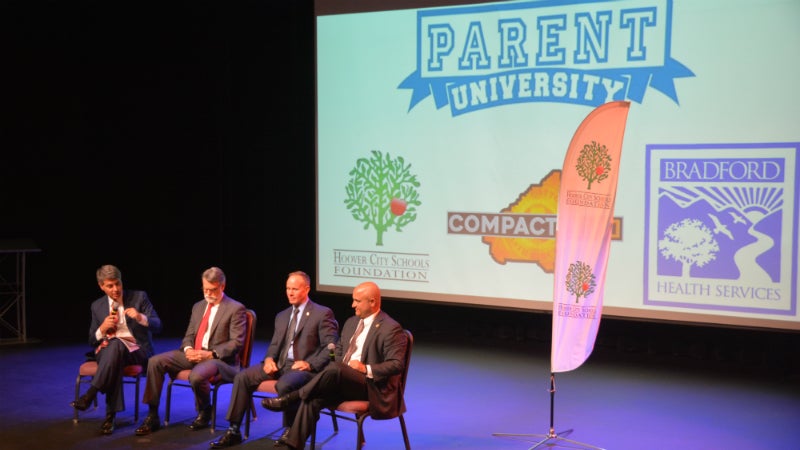Parent University offers information to combat drug use
Published 5:08 pm Wednesday, October 31, 2018

- Experts discuss drug abuse during the Parent University event at the Hoover Public Library on Tuesday, Oct. 30. (REPORTER PHOTO/STEPHEN DAWKINS)
HOOVER – Parents were equipped with information that could help them prevent their children abusing drugs at a Parent University event on Tuesday, Oct. 30.
Parent University was co-hosted by Compact 2020, Bradford Health Services and the Hoover City Schools Foundation, and held at the Hoover Public Library.
Resources were available to parents at different booths to begin Parent University, and then a roundtable-style discussion was held with three experts: Health Officer Mark Wilson with the Jefferson County Department of Health, Assistant Special Agent in Charge Bret Hamilton with the Drug Enforcement Administration, and Lloyd Peeples, first assistant U.S. attorney for the Northern District of Alabama.
The discussion was moderated by former legislator Paul DeMarco, who is also a member of the HCS Foundation Board of Directors, and began with the opioid crisis.
“Opioids is the biggest concern in terms of deaths, fatalities,” Wilson said.
Peeples said twice as many people died from opioid overdoses in Birmingham last year as from murders.
“Not only is it a problem nationwide, it’s a problem here in Alabama,” he said.
Hamilton added that Alabama is among the top five states in the country for over-prescribing, but doctors in general are slowly conforming to Centers for Disease Control recommendations.
DEA has prosecuted 15 doctors in the past three years, he said.
“That demonstrates how big the problem is,” Hamilton said.
Hamilton and Wilson advised parents that juveniles should usually not be prescribed opioids like Percocet and Oxycontin for minor procedures.
The United States accounts for about 5 percent of the world’s population but about 90 percent of the world’s use of opioids, mostly because of prescription medications being sold illegally.
The experts stressed that parents should be in control of such medications and monitor their child’s use of them—and avoid using them if possible.
Peeples said parents and officials must reach children before they have experimented with drugs, preferably at the middle school age, even though some parents may feel like that is too early to talk to their kids about drugs.
“If you’re not having the conversation, somebody else probably is,” he said.
The experts also pointed out the growing problem with Fentanyl, which is added to other drugs like heroin and even marijuana to increase their potency, but even a small amount of Fentanyl can be deadly.
Peeples urged parents not to take a careless approach to marijuana use, which is often seen as not as dangerous as other drugs.
“You’re playing with fire,” he said. “There’s not an easier way to say it. These are gateway drugs.”
Hamilton pointed to the negative consequences of legalizing marijuana in other states, and how the substance is being marketed toward youth there.
“All the things the tobacco industry used to do back in the ‘60s, they’re doing the same thing in Colorado and California with marijuana,” he said.
Wilson concluded by talking about the damage marijuana can do to the developing brains of young people.
“Marijuana doesn’t tend to kill people, but it can wreck a kid’s life,” he said.
Following the roundtable, breakout sessions were held on topics including parenting, e-cigs and social media.









